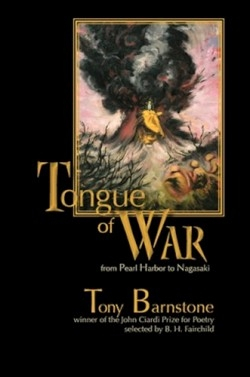Tongue of War
From Pearl Harbor to Nagasaki
In this collection, Tony Barnstone explores the events of World War II in the Pacific from both sides of the conflict. As his poem “Hindsight” puts it, “Seems everyone has points of view / but no one has perspective.”
Juxtaposing the voices of many different participants-from American GIs to Japanese doctors, from Navy nurses in the Philippines to housewives in Tokyo, from scientists building the bomb to the ones who survived it-Barnstone evokes the brutality and banality of war as others might have experienced it. He mines letters, interviews, oral histories, and personal conversations for other people’s memories of what it was like to be, say, a kamikaze pilot in Okinawa or a crewman on a burning ship in Pearl Harbor.
Themes of fire and water run through many of these retrospective poems. Oxymoronic images such as the “flaming lake” of Pearl Harbor or the “black rain” that fell like wet tar in Hiroshima fit with his use of opposition and contrasting points of view.
Barnstone is a professor of English language and literature at Whittier College, translator of Chinese poetry, and winner of the John Ciardi Prize for Poetry. While the poems here lack the immediacy of firsthand experience, they do stem from a genuine curiosity about the times and people who fought the war. At their best, they achieve a narrative drive that impels the reader to the end-and the reader is often glad to reach it, when the litany of grisly details ends: in “Beriberi,” a POW “was puffed up so bad / my testicles were softballs”; a survivor in “The Bataan Death March” recalls the body of “a raped girl / a bamboo stake stuck in her privates”; a kid in Hiroshima remembers his mom “had a baby boy and died / with him. Only his head was born.”
While the rhyme schemes can feel forced or contrived in poems like “Reversal at the Battle of Midway”-in which reversed rhymes (saw/was) pay tribute to the fact that the Battle of Midway was a turning point in the war-they work well in poems such as “Milk Run,” in which the loose, even careless rhymes fit the inveterate American spirit of optimism of a young pilot (a kid) in a Japanese prison camp.
Sure to appeal to history buffs and veterans of armed combat, these poems fan the flames of the past like “that punk Death [who] worked at the bellows” in the forge of war. (December) Trina Carter
Disclosure: This article is not an endorsement, but a review. The publisher of this book provided free copies of the book to have their book reviewed by a professional reviewer. No fee was paid by the publisher for this review. Foreword Reviews only recommends books that we love. Foreword Magazine, Inc. is disclosing this in accordance with the Federal Trade Commission’s 16 CFR, Part 255.

